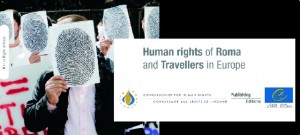Gitanos, Adultos, Ver, Documentos sociales: Informes y Estudios, Regiones Mundiales,
Documento. Human rights of Roma and Travellers in Europe (342 descargas)Informe sobrela situación de los derechos humanos de los gitanos y nómadas en Europa presentdo en 2012 por la Comisión de Derechos Humanos del Consejo de Europa
Fuente: Comisión de Derechos Humanos del Consejo de Europa
Presentación del Recurso
El 27 de febrero de 2012, el Comisario de Derechos Humanos del Consejo de Europa, Thomas Hammarberg, presentó en Bruselas el informe ‘Human rights of Roma and Travellers in Europe’ que constituye el primer panorama general de la situación de los derechos humanos de los romaníes y nómadas (travellers) en los 47 Estados miembros del Consejo de Europa.Según este informe las comunidades gitanas constituyen la minoría más numerosa y más vulnerable de Europa.
 Índice
Índice
Foreword
Summary
Acknowledgements
Introduction
1. Anti-Gypsyism
1.1. Public leaders and anti-Gypsy rhetoric
1.2. Extremist groups
1.3. Media
1.4. Promotion of hatred on the Internet
1.5. Anti-Gypsyism and recognition of the genocide of the Roma during the Second World War
2. Racially motivated violence against Roma and Travellers
3. Treatment of Roma and Travellers by law enforcement and judicial authorities
3.1. Police abuse of Roma and Travellers
- Police violence
- Racial profiling, including stop-and-search, raids and profiling at the border
- Arbitrary seizure or destruction of property
- Arbitrary detention
3.2. Roma and Travellers in the justice systems of Europe
- Treatment of Roma and Travellers by criminal justice authorities in Europe
- Challenging racial discrimination against Roma and Travellers in court
4. Respect for private and family life of Roma and Travellers
4.1. Forced and coercive sterilisations of Roma women
4.2. Removal of Roma children from the care of their biological parents
4.3. Common law and customary marriage among certain Roma groups
5. Roma and trafficking in human beings
6. Enjoyment by Roma and Travellers of economic and social rights
6.1. The right to education
- Exclusion from formal schooling, including ineffective measures to combat school abandonment
- Segregation of Roma children
- Access to school by Roma girls
- Provision for Traveller education
- Romani language, history and culture in education, including suppression of anti-Roma stereotypes in the school curriculum
6.2. Access to adequate housing
- Discrimination in access to adequate housing, as well as in housing policy and practice
- Segregation: informal settlements, excluded localities and other separated housing arrangements
- Substandard housing conditions
- Security of tenure and forced evictions
- Enjoyment of the right to adequate housing by Travellers
- Homelessness
6.3. Access to employment
- High unemployment rates among Roma and Travellers
- Direct discrimination in access to employment and in the workplace
- Indirect discrimination in access to employment
- Employment of Roma women
- Over-representation of Roma in un- and underqualified
- employment and in the informal economy
- Efforts to improve Roma access to the labour market
6.4. The right to the highest attainable standard of physical and mental health
- Denial of and discrimination by emergency medical services
- Discrimination by health care providers, including segregated wards
- Exclusion from health insurance and denial of medical services as a result of a lack of personal documents or related status issues
- Exclusion from health care as a result of physical distance from health care facilities
- Health outcomes
- Roma and health care systems: overcoming mistrust
6.5. The right to social security
6.6. Access to goods, services and public places
7. Statelessness and gaps in personal documentation of Roma
7.1. Lack of personal identification documents
7.2. Statelessness in the context of state succession and transformation of the citizenship regime
8. Enjoyment by Roma and Travellers of freedom of movement and international protection
inside and outside the state territory
8.1. Free movement within a territory
8.2. International protection and internal displacement
8.3. Collective and individual expulsion
8.4. Exercise of freedom of movement by Roma and Travellers in the European Union
9. Participation of Roma and Travellers in public life and decision-making processes
9.1. Registration and exercise of the right to vote
9.2. Representation in elected bodies
9.3. Representation in consultation mechanisms
9.4. Representation in civil service
Conclusions
Bibliography


